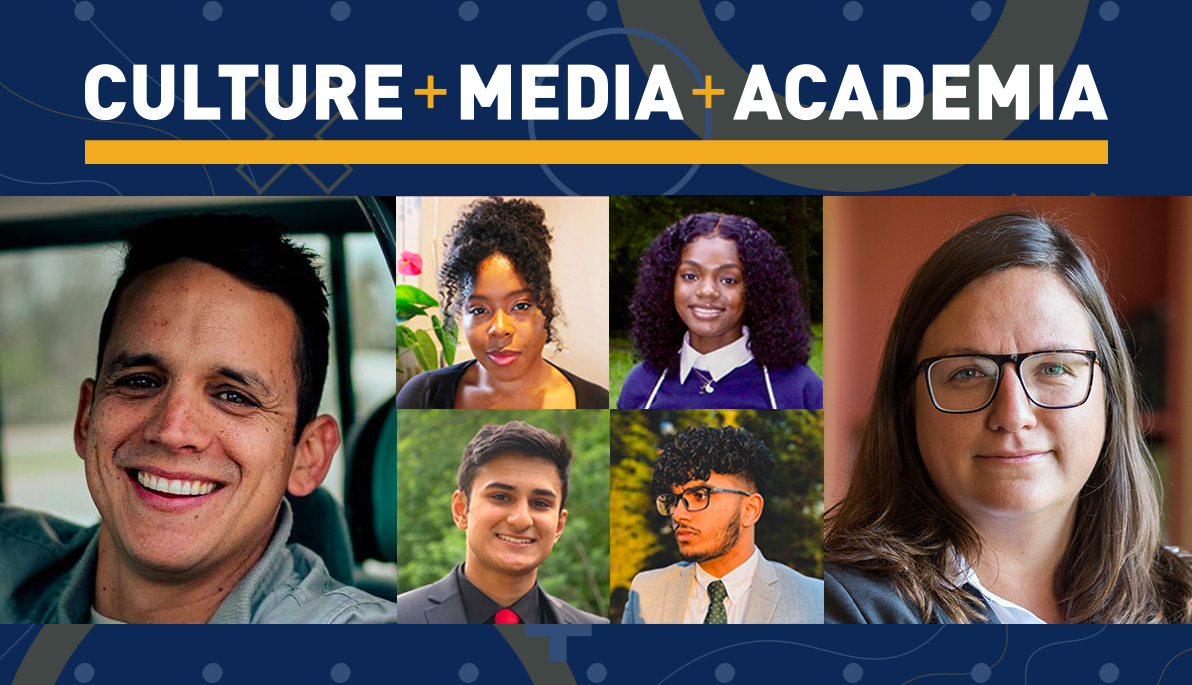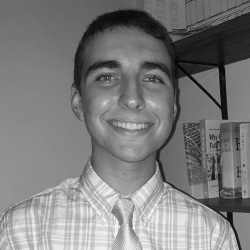News
Panel, Guest Speaker Explore Technology in Students’ Lives
November 11, 2021
Far left: Trevor Muir; far right: Melissa Huey; center, clockwise from top left: Paulana Lamonier, Tiffany Roberts, Alvin Stanley, Yash Trivedi
Since the beginning of the COVID-19 pandemic, society has relied heavily on technology in everyday life, especially in education. And because of this, the lives of students have changed drastically—in both positive and negative ways that affect how they receive and share information, how they learn and work, and how they conduct their lives.
To help students explore this evolution, the Office of Student Life held a two-part virtual event titled “Culture + Media + Academia: The Impact on the Gen Z Learning Experience.” Part one, held on October 27, was a discussion among New York Tech students, led by Melissa Huey, Ph.D., assistant professor of psychology, and Paulana Lamonier, New York Tech social media strategist. They were joined by students Tiffany Roberts, a junior studying chemistry, who is also the Black Student Union vice president and National Society of Student Leadership membership outreach chair; Alvin Stanley, who is enrolled in the seven-year B.S., Life Sciences/D.O., Osteopathic Medicine program and secretary of the Student Government Association (SGA) on the Long Island campus; and Yash Trivedi, a fourth-year student also in the B.S./D.O. program and current vice president of the Long Island SGA.
When asked about inherent boundaries related to technology, Roberts mentioned personal decisions she made in her use of technology and social media, and how it is currently helping her.
“I’m at my desk most of the day, and I don’t talk much with others, but I can’t be constricted. Same with social media, being involved too much with technology can get you distracted,” said Roberts. “For example, a notification pops up on Instagram. Instead of looking at it for a few minutes, it can turn into hours. I actually took the initiative to delete all my social media platforms so I can be more attentive towards my responsibilities.”
An interesting point brought up by Lamonier was the importance of building your personal brand as well as setting boundaries on what to share on social media.
“Social media is a place of opportunity to brand yourself to be the person you want to be. Platforms such as Instagram can help you with that,” she said. “However, the question is: are you able to uphold that representation? My mother always said, ‘Don’t cash a check you can’t write.’ Therefore, figure out who and what you are.”
Lamonier emphasized not reveal too much information in real-time or about yourself on social platforms. One example she offered is not sharing your current locations and addresses.
Cheating has also become a very controversial topic for students since the start of virtual learning, making academic dishonesty much easier. Trivedi offered one viewpoint: “Cheating is intentional, but it can be unintentional sometimes, although the line can be blurred. I believe as long as you are actively learning and progressing in what you are learning, that’s all that matters. But if you are cheating just for personal benefit, then there is a problem, even if it’s unintentional.”
Roberts added to Trivedi’s comments, stating that if one cheats, they are just cheating on themselves since you need to learn the information to perform well in your future careers. One student noted that in some cases students may genuinely not understand the work at hand and may not have the support they need. As a result, they will turn to cheating. However, members of the audience mentioned that from previous experiences, teachers had found alternative resources to prevent cheating, such as lockdown browsers or even class projects.
The group concluded that although the pandemic has changed the way of student life, it is ultimately the student’s decision if they will use technology as a source of academic learning or for selfish gain.
The second event, “Discovering Purpose to Grow in Skills, Technology, and Life,” was held on November 3 and featured guest speaker Trevor Muir, a professor at Grand Valley State University and an Andrew Gomez Dream Foundation speaker. Muir’s virtual presentation addressed discovering one’s purpose and passion in their lives, and how technology can be used as a catalyst for success.
He opened his talk by sharing his own experiences with attendees. He described his life as a college student who was a “loud, boisterous guy and the life of the party.” While he wasn’t academically focused and/or following a career path, things changed for him when he was a college senior and became an English tutor for young students. When Muir saw his mentees improving in English class and realized the impact he could make, he felt an urge to do more.
After graduating, he moved to Michigan with a goal at hand: to become an educator. While studying, he learned how to develop so-called “soft skills” that included confidence, collaboration, critical thinking, work ethic, adaptability, and communication. Muir noted that young adults are being fired from their jobs because they haven’t developed soft skills, noting that today’s educational system doesn’t emphasize these things to students.
He mentioned that technology, especially during the pandemic, allows us to connect and can help develop our soft skills—even those far away can benefit and learn. For example, students can now collaborate and communicate while they work on an assignment using online tools such as Zoom, Google Docs, and Trello. This technology breaks barriers and teaches skills like interpersonal communication, adaptability, and time management. Muir concluded his talk with a powerful statement: “Technology has the power to damage, but it also has the power to encourage.”
The Trevor Muir event was sponsored by the Offices of Student Life and Student Engagement and Development, the Colleges of Engineering and Computing Sciences and Arts and Sciences, and the School of Health Professions.





